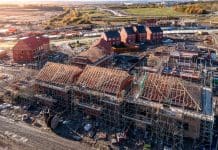Despite subdued order books, the latest PMIs find UK construction business activity expectations at their highest since January 2022
UK construction optimism is on the rise, according to the latest PMI figures.
This was despite a moderate decline in total industry activity, as signified by the index remaining below the 50.0 no-change threshold for the fifth month running.
Regardless, the index registered 48.8 in January, up from 46.8 in December.
Civils stayed strong, whereas housebuilding continued the freefall
Output levels in civil engineering performed the best in January 2023, (index at 49.8), with commercial activity resilient in the face of a minor decline to 49.1.
Meanwhile, housebuilding fell (index to 44.2), with anecdotal accounts of subdued demand conditions and a lack of work to replace completed projects.
The rate of contraction for residential activity nonetheless eased to the least marked since March 2023.
New work declined, but only marginally
January saw the sixth consecutive month of a reduction in total new work, but the rate of decline was at its most marginal over the period.
Companies reporting a fall in new business generally cited delayed decision-making among clients and subdued market conditions, especially in the house building segment.
Construction companies remained cautious about staff hiring in January
Total employment numbers fell fractionally, while sub-contractor usage was broadly unchanged since the previous month. Rates charged by sub-contractors increased at the fastest pace since September 2023, despite a robust and accelerated improvement in availability.
The highest level of business optimism in UK construction since January 2022
Despite subdued order books, the latest data signaled a sharp upturn in business activity expectations. Around 51% of the survey panel forecast a rise in business activity during the year ahead, while only 12% predict a decline.
Lower borrowing costs and higher consumer confidence were cited as factors likely to boost construction activity over the course of 2024.
Demand for construction inputs softened for the fifth consecutive month in January, with survey respondents commenting on weak demand and ongoing efforts to minimise inventory holdings.
The fastest rise in input costs since May 2023 was observed
Meanwhile, suppliers’ lead times shortened again as an improved balance between demand and supply helped to reduce delivery delays.
January data indicated a renewed increase in purchasing prices across the construction sector, following three months of falling costs.
Some firms commented on higher prices paid for imported items, especially those that had incurred additional shipping costs.
Tim Moore, economics director at S&P Global Market Intelligence, said: “UK construction companies seem increasingly optimistic that the worst could be behind them soon as recession risks fade and interest rate cuts appear close on the horizon. The prospect of looser financial conditions and an improving economic backdrop meant that business activity expectations strengthened to the highest for two years in January.”
With the market semi-stable, eyes turn to the Spring Budget
Daniel Wood, construction partner at Gowling WLG, commented: “Despite escalating inflation, construction has remained remarkably resilient where the rate of projects being commissioned is concerned, as well as the record revenue that these have consistently generated.
“A resurgence in student accommodation commissions, as well as ongoing commercial projects within town and city centres, has helped overshadow a drop in homebuilding.
“Of course, profitability is not the only focus for the sector at the moment, given the focus of the recent COP28 conference and subsequent climate-action plans to cut emissions within the building and construction sectors. Prioritising this consideration will therefore be paramount where winning work is concerned, especially for commercial projects.
“It will also be interesting to see whether the upcoming Spring budget brings any further government support around easing planning difficulties and other barriers to these, and other types of new projects being commissioned in 2024.”














